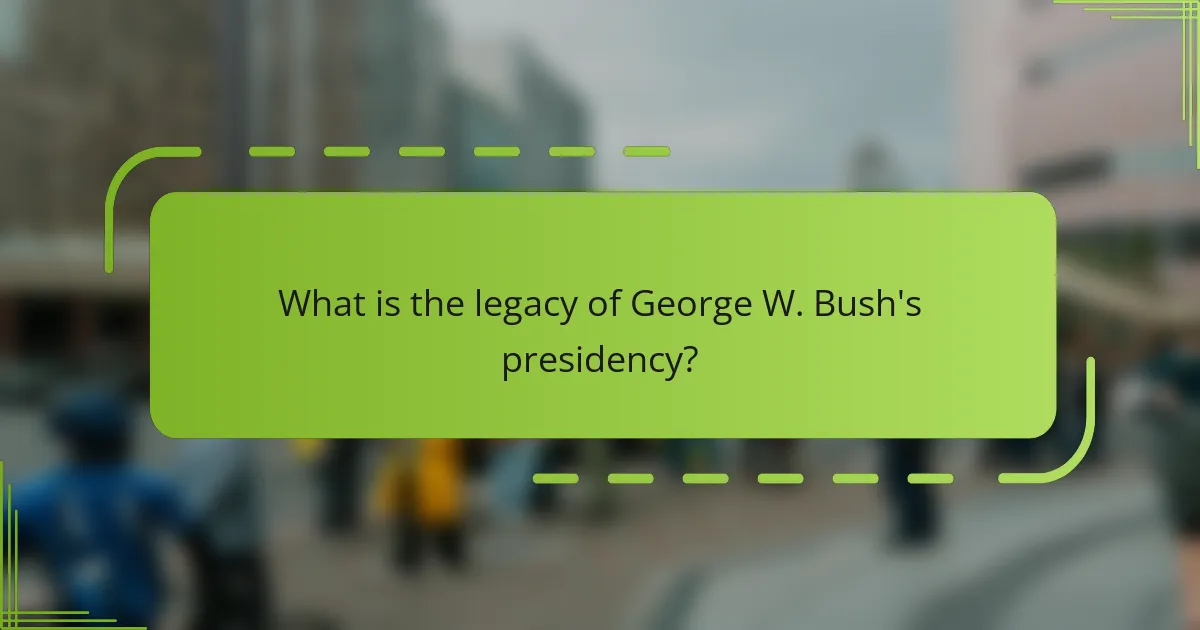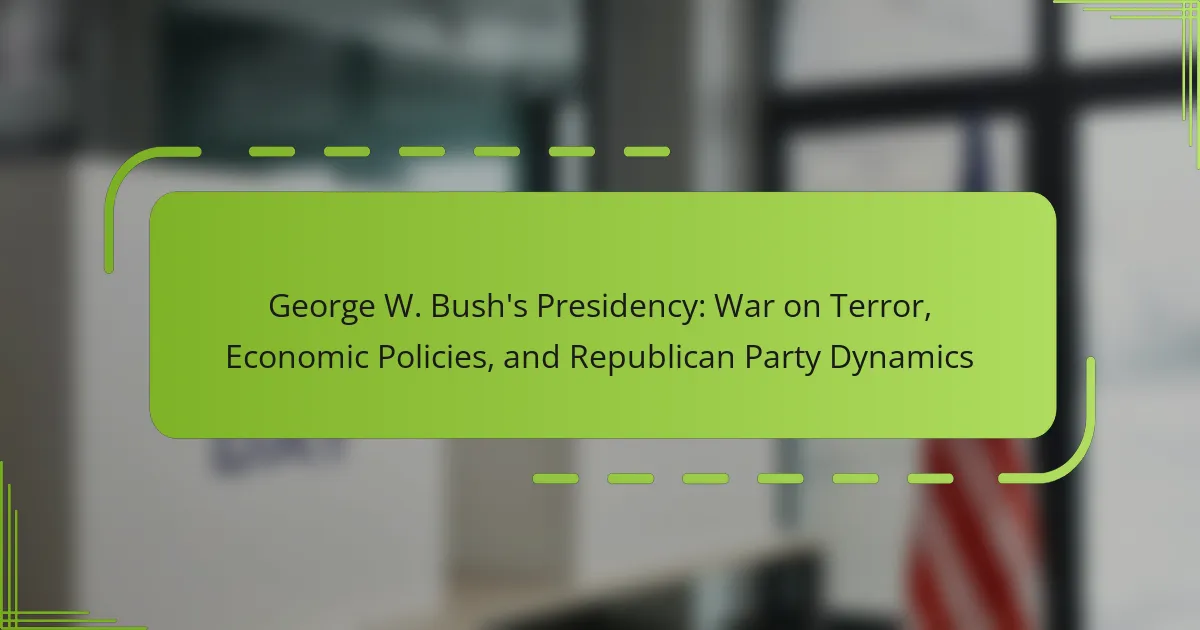
What were the key events during George W. Bush’s presidency?
Key events during George W. Bush’s presidency include the September 11 attacks in 2001. This event led to the initiation of the War on Terror. The U.S. invaded Afghanistan in October 2001 to dismantle Al-Qaeda and remove the Taliban regime. In March 2003, the U.S. launched the invasion of Iraq, citing weapons of mass destruction as justification. The financial crisis of 2008 occurred during his second term, leading to significant economic instability. The Medicare Prescription Drug, Improvement, and Modernization Act was passed in 2003, expanding Medicare benefits. Bush’s presidency also saw the implementation of tax cuts in 2001 and 2003, aimed at stimulating the economy. His administration faced criticism for its handling of Hurricane Katrina in 2005, which exposed weaknesses in disaster response.
How did the War on Terror shape George W. Bush’s presidency?
The War on Terror significantly shaped George W. Bush’s presidency. It defined his foreign policy agenda and led to military interventions in Afghanistan and Iraq. The September 11 attacks in 2001 prompted a swift response, resulting in the establishment of the Department of Homeland Security. Bush’s administration implemented the USA PATRIOT Act, expanding surveillance and law enforcement powers. The War on Terror also influenced public opinion, leading to increased support for military action. His presidency focused on national security, impacting domestic and international relations. The legacy of the War on Terror continues to affect U.S. policy today.
What triggered the War on Terror?
The War on Terror was triggered by the September 11, 2001 terrorist attacks. These attacks were orchestrated by the extremist group al-Qaeda. Nearly 3,000 people were killed in the attacks on the World Trade Center and the Pentagon. In response, President George W. Bush declared a global War on Terror. This involved military action against al-Qaeda and the Taliban in Afghanistan. The goal was to eliminate terrorist threats and prevent future attacks. The declaration marked a significant shift in U.S. foreign policy. It led to prolonged military engagements in multiple countries.
How did the War on Terror affect U.S. foreign policy?
The War on Terror significantly shifted U.S. foreign policy towards a focus on counterterrorism. It led to military interventions in Afghanistan and Iraq, aiming to dismantle terrorist networks. The U.S. adopted a doctrine of preemptive strikes, justifying military action to prevent perceived threats. This approach altered alliances, as nations were pressured to support U.S. initiatives or face isolation. The policy emphasized security over diplomacy, impacting relations with countries in the Middle East. The U.S. also increased intelligence operations globally, reshaping its international engagement strategies. Additionally, the War on Terror fostered a narrative of promoting democracy, often used to justify interventions. Overall, these changes marked a departure from traditional foreign policy practices.
What economic policies did George W. Bush implement?
George W. Bush implemented several economic policies during his presidency. Key policies included tax cuts, specifically the Economic Growth and Tax Relief Reconciliation Act of 2001. This act reduced income tax rates across various brackets. It also provided a one-time rebate to taxpayers. In 2003, the Jobs and Growth Tax Relief Reconciliation Act further cut taxes and accelerated depreciation for businesses.
Bush’s administration emphasized deregulation, particularly in the energy and financial sectors. The policies aimed to stimulate economic growth and job creation. However, critics argue that these tax cuts disproportionately benefited the wealthy. The policies contributed to budget deficits, especially following the 2008 financial crisis.
Overall, Bush’s economic policies focused on tax relief and deregulation to foster growth. The impact of these policies remains a topic of debate among economists and policymakers.
What were the major tax cuts during his presidency?
The major tax cuts during George W. Bush’s presidency were the Economic Growth and Tax Relief Reconciliation Act of 2001 and the Jobs and Growth Tax Relief Reconciliation Act of 2003. The 2001 Act reduced tax rates across the board, lowered the marriage penalty, and increased the child tax credit. It aimed to stimulate the economy following the 2001 recession. The 2003 Act accelerated tax cuts from the 2001 Act and reduced capital gains and dividends taxes. Together, these cuts significantly impacted federal revenue and aimed to promote economic growth.
How did the economic policies impact the U.S. economy?
Economic policies during George W. Bush’s presidency significantly impacted the U.S. economy. Tax cuts were implemented, notably the Economic Growth and Tax Relief Reconciliation Act of 2001. These cuts aimed to stimulate economic growth by increasing consumer spending. However, they also contributed to budget deficits, which reached $1.4 trillion by 2008.
Additionally, the policies included increased government spending, particularly on defense due to the War on Terror. This spending further fueled the national debt, which rose from $5.6 trillion in 2001 to $10 trillion by the end of his presidency.
The combination of tax cuts and increased spending led to a mixed economic outcome. Unemployment rates decreased initially, reaching 4.4% in 2007. However, the economy faced significant challenges, including the financial crisis of 2008, which was partly attributed to deregulation in the financial sector.
Overall, the economic policies of this era had lasting effects on fiscal health and economic stability in the U.S.
What were the dynamics within the Republican Party during his presidency?
During George W. Bush’s presidency, the Republican Party experienced significant internal dynamics. The party united under the banner of the War on Terror following the September 11 attacks in 2001. This unity was driven by a shared commitment to national security and military action. However, divisions emerged over economic policies, particularly regarding tax cuts and government spending. Fiscal conservatives often clashed with those advocating for increased defense and homeland security budgets. The party also faced challenges from the growing influence of the Tea Party movement, which emphasized limited government and fiscal restraint. Additionally, Bush’s handling of the Iraq War sparked debates within the party about foreign policy and military intervention. These dynamics reflected a struggle between traditional Republican values and emerging populist sentiments. Overall, the Republican Party during Bush’s presidency was marked by both cohesion in the face of external threats and internal conflict over key policy issues.
How did George W. Bush influence the Republican Party’s direction?
George W. Bush significantly influenced the Republican Party’s direction through his policies and leadership style. His presidency marked a shift towards a more interventionist foreign policy, particularly evident in the War on Terror following the September 11 attacks. This approach emphasized national security and military strength, reshaping the party’s platform to prioritize defense and counterterrorism.
Bush’s economic policies included tax cuts aimed at stimulating growth, which became a hallmark of Republican economic strategy. His administration’s response to the 2008 financial crisis, however, led to increased government intervention, challenging traditional Republican ideals of limited government.
Furthermore, Bush’s compassionate conservatism introduced social issues into the party’s agenda, focusing on education reform and healthcare initiatives like Medicare Part D. This blend of foreign, economic, and social policies solidified a distinct identity for the Republican Party during his tenure, influencing its direction for years to come.
What challenges did the Republican Party face during his administration?
The Republican Party faced significant challenges during George W. Bush’s administration. These challenges included managing the aftermath of the September 11 attacks. The party struggled with the implications of the War on Terror, particularly the wars in Afghanistan and Iraq. Public opinion shifted as the wars prolonged, leading to declining support for Republican policies. Economic issues also posed difficulties, notably the 2008 financial crisis. This crisis undermined the party’s claims of fiscal responsibility. Additionally, internal divisions emerged over the direction of the party and its core values. These factors collectively impacted the Republican Party’s standing in subsequent elections.

How did George W. Bush’s presidency influence global politics?
George W. Bush’s presidency significantly influenced global politics through the War on Terror. After the September 11 attacks in 2001, Bush initiated military operations in Afghanistan. This action aimed to dismantle al-Qaeda and remove the Taliban from power. The invasion marked a shift in U.S. foreign policy towards preemptive strikes.
Bush’s doctrine emphasized combating terrorism globally. He justified the Iraq War in 2003 by claiming Iraq possessed weapons of mass destruction. This led to widespread debate and criticism internationally. The wars in Afghanistan and Iraq reshaped U.S. relations with various countries.
Bush’s presidency also saw the expansion of NATO’s role in global security. His administration promoted democracy and free markets in the Middle East. These efforts aimed to stabilize the region but often faced resistance.
Overall, Bush’s presidency left a lasting impact on international relations and security policies. The consequences of his decisions continue to influence global politics today.
What were the international responses to the War on Terror?
International responses to the War on Terror varied significantly among nations. Many countries, including the United Kingdom and Australia, expressed strong support for U.S. actions post-9/11. They participated in military operations in Afghanistan alongside U.S. forces. Other nations, particularly in the Middle East, had mixed reactions. Some governments cooperated with the U.S. to combat terrorism, while others faced internal dissent regarding American military presence. The United Nations passed resolutions endorsing anti-terrorism measures, emphasizing global cooperation. However, some nations criticized the War on Terror, citing concerns over human rights violations and the impact of military interventions. Overall, the international community’s responses reflected a complex interplay of support, criticism, and strategic interests.
How did alliances shift during this period?
During George W. Bush’s presidency, alliances shifted significantly due to the War on Terror. The September 11 attacks in 2001 prompted a reevaluation of international relations. The U.S. strengthened ties with traditional allies like the United Kingdom and Canada. Simultaneously, it sought new partnerships with countries like Pakistan and Afghanistan for military support. The invasion of Iraq in 2003 led to strained relations with some European allies, notably France and Germany. Additionally, the U.S. faced criticism from global organizations, impacting its diplomatic standing. These shifts illustrate the dynamic nature of alliances during a period of heightened security concerns and military action.
What were the long-term effects on U.S. relations with other countries?
The long-term effects on U.S. relations with other countries included increased tensions and strained alliances. Following the War on Terror, many nations viewed U.S. military interventions as unilateral actions. This led to a decline in global support for U.S. policies. The invasion of Iraq in 2003 particularly alienated traditional allies. Countries like France and Germany opposed the war, causing diplomatic rifts. Anti-American sentiment grew in various regions, especially in the Middle East. The U.S. faced criticism for its handling of human rights issues, such as in Guantanamo Bay. These factors contributed to a more complex international landscape for the U.S. in subsequent years.
What economic consequences arose from his policies on a global scale?
George W. Bush’s policies had significant economic consequences on a global scale. His tax cuts led to increased budget deficits, impacting global markets. The War on Terror escalated military spending, diverting funds from domestic programs. This created instability in international oil markets, causing prices to rise. Trade relations were affected due to increased protectionist measures. The 2008 financial crisis was partly attributed to deregulation policies initiated during his presidency. Global economic growth slowed as a result of these factors. International investors became wary of U.S. economic stability. Overall, Bush’s policies contributed to a more volatile global economic environment.
How did the 2008 financial crisis relate to his economic policies?
The 2008 financial crisis was significantly influenced by George W. Bush’s economic policies. His administration promoted deregulation in the financial sector. This included the repeal of the Glass-Steagall Act in 1999, which separated commercial and investment banking. Deregulation allowed financial institutions to take on excessive risks. The housing bubble was fueled by policies encouraging home ownership and subprime lending. These factors contributed to the eventual collapse of major financial institutions. The crisis led to widespread economic downturn and unemployment. Bush’s policies are often criticized for creating an environment that precipitated the crisis. The aftermath required significant government intervention, including the Troubled Asset Relief Program (TARP) initiated in 2008.
What lessons were learned by other nations from the U.S. economic approach?
Other nations learned several key lessons from the U.S. economic approach during George W. Bush’s presidency. First, the importance of tax cuts as a stimulus measure became evident. The U.S. implemented significant tax reductions to spur economic growth. This approach aimed to increase consumer spending and investment.
Second, the role of government intervention in the economy was highlighted. The U.S. response to the 2008 financial crisis included substantial bailouts for key industries. This demonstrated the potential necessity of government support during economic downturns.
Third, the impact of deregulation was noted. The U.S. pursued deregulation in various sectors, which some nations viewed as a double-edged sword. While it can promote growth, it can also lead to instability if not managed carefully.
Finally, the U.S. economic approach underscored the significance of global trade. The Bush administration emphasized free trade agreements to boost economic ties. Other nations recognized the benefits of integrating into the global economy for growth and development.

What is the legacy of George W. Bush’s presidency?
The legacy of George W. Bush’s presidency is marked by significant events and policies. His administration is primarily known for the War on Terror following the September 11 attacks in 2001. This led to the invasions of Afghanistan and Iraq. Bush’s foreign policy emphasized preemptive strikes against perceived threats. Domestically, his presidency saw tax cuts aimed at stimulating the economy. The financial crisis of 2008, however, overshadowed these efforts. His administration’s response to Hurricane Katrina drew criticism for inadequate disaster management. Additionally, Bush’s tenure influenced the Republican Party’s direction and identity. His legacy remains contentious, with ongoing debates about the effectiveness of his policies.
How is George W. Bush viewed in historical context?
George W. Bush is viewed as a controversial figure in historical context. His presidency was marked by significant events such as the September 11 attacks in 2001. This led to the initiation of the War on Terror, including the wars in Afghanistan and Iraq. Critics argue that these decisions resulted in long-term instability and high casualties. Supporters claim he strengthened national security and responded decisively to terrorism. Economically, his administration faced criticism for tax cuts and the handling of the 2008 financial crisis. Public opinion on Bush has fluctuated over time, with some viewing him more favorably as years passed. His legacy continues to influence Republican Party dynamics and foreign policy discussions today.
What factors contribute to the differing opinions on his presidency?
Differing opinions on George W. Bush’s presidency stem from various factors. One significant factor is his handling of the War on Terror. Supporters argue that his actions were necessary to combat terrorism after 9/11. Critics believe these actions led to prolonged conflicts and loss of life. Economic policies also play a role in shaping opinions. His tax cuts are viewed positively by some as a means to stimulate the economy. Others criticize them for increasing the national deficit. Additionally, party dynamics within the Republican Party influence perspectives. Some members align with Bush’s strategies, while others advocate for a more moderate approach. Public perception is further affected by media portrayal and historical context. These elements contribute to the complex landscape of opinions regarding his presidency.
How have perceptions of his presidency changed over time?
Perceptions of George W. Bush’s presidency have evolved significantly since he left office. Initially, he faced widespread criticism for his handling of the Iraq War and the economy. In the years immediately following his presidency, his approval ratings were low, hovering around 30%. Over time, some historians and political analysts began to reassess his leadership.
Post-presidency, views shifted as people reflected on issues like national security and the response to 9/11. By 2018, a Gallup poll showed that 61% of Americans viewed him favorably. This change is partly due to comparisons with subsequent administrations. His presidency is now often seen in a more favorable light regarding foreign policy and terrorism.
The economic crisis of 2008 also influenced perceptions. Some argue that his policies laid the groundwork for recovery. Thus, perceptions of Bush’s presidency have transformed from criticism to a more nuanced understanding of his impact over time.
What practical lessons can be drawn from George W. Bush’s presidency?
Practical lessons from George W. Bush’s presidency include the importance of decisive leadership during crises. His response to the September 11 attacks demonstrated the need for swift action in times of national emergency. Additionally, the presidency highlighted the complexities of foreign intervention. The Iraq War illustrated the challenges of nation-building and the potential for unintended consequences. Economic policies under Bush showed the significance of fiscal responsibility. Tax cuts aimed at stimulating growth also raised concerns about long-term budget deficits. The presidency emphasized the need for bipartisan cooperation. Major legislation often required support from both parties to achieve meaningful progress. Lastly, the administration’s communication strategies underscored the impact of public perception in governance. Effective messaging can shape policy outcomes and influence public opinion.
How can future leaders learn from his approach to crisis management?
Future leaders can learn from George W. Bush’s approach to crisis management by studying his decisive communication style. He effectively addressed the nation during crises, providing reassurance and clarity. His use of clear messaging helped to unify public sentiment. Leaders can also note his emphasis on collaboration with experts to inform decisions. Bush’s administration often relied on advisors and military leaders for insights. This approach demonstrated the value of gathering diverse perspectives in crisis situations. Additionally, his focus on maintaining a strong public presence showcased the importance of visibility during crises. Leaders should recognize the significance of being present and engaged with stakeholders. Overall, Bush’s strategies highlight the need for clear communication, collaboration, and visibility in effective crisis management.
What strategies can be applied from his economic policies today?
Tax cuts and deregulation are key strategies from George W. Bush’s economic policies that can be applied today. His administration implemented significant tax cuts aimed at stimulating economic growth. These cuts were designed to increase disposable income for individuals and businesses.
Deregulation efforts focused on reducing government intervention in markets. This approach encouraged investment and innovation. Evidence from the early 2000s shows that these policies contributed to economic expansion.
Additionally, promoting free trade agreements can be an effective strategy. Bush’s administration supported various trade deals, which helped enhance global market access for American goods.
Overall, these strategies emphasize economic growth through reduced taxes, less regulation, and increased trade.
The main entity of the article is George W. Bush’s presidency, which encompasses significant events, economic policies, and dynamics within the Republican Party. Key events include the September 11 attacks, the initiation of the War on Terror, invasions of Afghanistan and Iraq, and the financial crisis of 2008. The article examines how the War on Terror shaped U.S. foreign policy, the impact of Bush’s economic policies including tax cuts and deregulation, and the internal dynamics and challenges faced by the Republican Party during his administration. Additionally, it explores the long-term effects of his presidency on global politics and U.S. relations with other countries.
